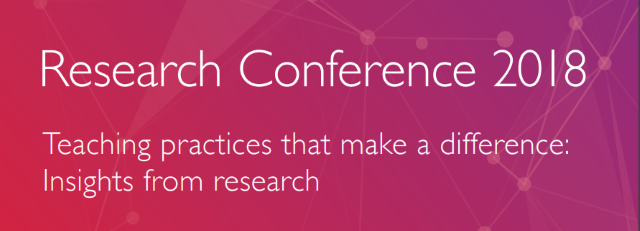
Monday 13 August 2018
Start Date
13-8-2018 1:30 PM
End Date
13-8-2018 2:30 PM
Subjects
Generic skills, Evaluation methods, Skill development, Student assessment, Primary secondary education, Knowledge base for teaching
Abstract
There is wide recognition that students need to be equipped with appropriate social and cognitive skills demanded by society and the workforce. The unresolved question is how to do this. Many education systems globally are addressing this demand by including skills such as critical thinking, problem-solving, collaboration, and creativity into curriculum documents or supplementary materials. However, there is little research to guide educators in teaching such skills at school level. The need to develop practical solutions for assessing and teaching social and cognitive skills, broadly classified under the umbrella ‘21st-century skills’ or ‘general capabilities’, is ever increasing. An integrated approach to teaching and assessing the skills across domain areas is necessary for sustainability. Traditional methods of assessment are not sufficient to capture the complexity of how general capabilities are applied in real-world settings, and innovative methods need to be sought and validated. Teachers require professional development, resources and tools to be effective. This presentation outlines a study undertaken by the Centre for Assessment Reform and Innovation (CARI) at ACER to develop an assessment framework and a set of proof-of-concept tasks for measuring and monitoring the skills in the classroom. Through a combination of curriculum-focused assessment tools, learning progressions, and professional development, the agenda is to equip teachers to integrate teaching and assessing of general capabilities into their classroom. The assessment tools involve complex problem-solving tasks in which students need to demonstrate collaboration, critical thinking, creativity, information literacy, and communication skills. Learning progressions have been proposed for each of the skills to support identification of levels of proficiency and monitoring of student growth. This paper presents the work of the project so far and outlines plans for validation of the assessment framework, tools and learning progressions.
Recommended Citation
Scoular, C. (2018, August 13). Equipping teachers with tools to assess and teach general capabilities [Paper presentation]. Research Conference 2018 - Teaching practices that make a difference: Insights from research. https://research.acer.edu.au/research_conference/RC2018/13august/10
Presentation slides: Equipping teachers with tools to assess and teach general capabilities
Copyright Statement
Copyright Australian Council for Educational Research 2018
Place of Publication
Melbourne, Australia
Publisher
Australian Council for Educational Research (ACER)
ISBN
9781742865119
Included in
Curriculum and Instruction Commons, Educational Assessment, Evaluation, and Research Commons
Equipping teachers with tools to assess and teach general capabilities
There is wide recognition that students need to be equipped with appropriate social and cognitive skills demanded by society and the workforce. The unresolved question is how to do this. Many education systems globally are addressing this demand by including skills such as critical thinking, problem-solving, collaboration, and creativity into curriculum documents or supplementary materials. However, there is little research to guide educators in teaching such skills at school level. The need to develop practical solutions for assessing and teaching social and cognitive skills, broadly classified under the umbrella ‘21st-century skills’ or ‘general capabilities’, is ever increasing. An integrated approach to teaching and assessing the skills across domain areas is necessary for sustainability. Traditional methods of assessment are not sufficient to capture the complexity of how general capabilities are applied in real-world settings, and innovative methods need to be sought and validated. Teachers require professional development, resources and tools to be effective. This presentation outlines a study undertaken by the Centre for Assessment Reform and Innovation (CARI) at ACER to develop an assessment framework and a set of proof-of-concept tasks for measuring and monitoring the skills in the classroom. Through a combination of curriculum-focused assessment tools, learning progressions, and professional development, the agenda is to equip teachers to integrate teaching and assessing of general capabilities into their classroom. The assessment tools involve complex problem-solving tasks in which students need to demonstrate collaboration, critical thinking, creativity, information literacy, and communication skills. Learning progressions have been proposed for each of the skills to support identification of levels of proficiency and monitoring of student growth. This paper presents the work of the project so far and outlines plans for validation of the assessment framework, tools and learning progressions.


Comments
Session 4O